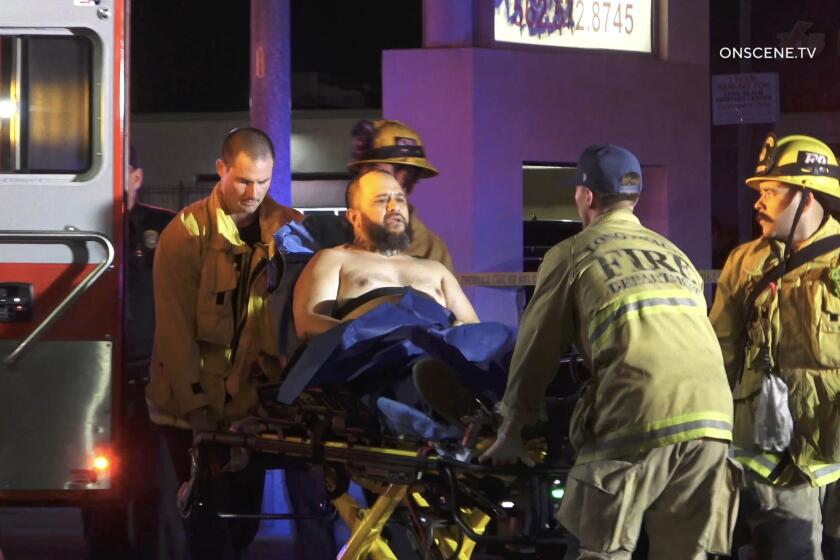Marriage Between 2 Court Systems Dissolved : Law: A decision by the Ventura County Superior Court to stop assigning cases to lower-court jurists ends experiment. Judges say the vote has created ill will.
After a trial marriage, the Superior Court has decided to separate from the Municipal Court--possibly ending a ballyhooed experiment to bring Ventura County a single, more efficient system of justice.
“They have filed for divorce,” a disappointed John R. Smiley, presiding judge of the Municipal Court, said Monday of the unilateral decision to stop assigning cases to lower-courts jurists next year.
That could mean that civil and criminal cases before the higher court would take much longer to get to trial, officials said. And judges on both courts said privately that the vote last week has already created ill will.
Now, two of the county’s 12 Municipal Court judges are assigned full time to the overloaded Superior Court.
But because of the Superior Court decision, Smiley said the plan under which municipal judges serve long stints on the superior bench would be dumped after the current agreement expires July 1.
Superior Court judges said they are hopeful that the entire consolidation will not have to be scrapped. But no alternative has yet been discussed.
Because an initiative to consolidate courts across California failed to make the November ballot, some Superior Court judges said they felt it was no longer appropriate to unify the two courts locally.
“My understanding is that a lot of judges thought it was illegal in the beginning,” said Superior Court Judge Charles W. Campbell Jr., chief of the felony division.
But Smiley said some Municipal Court judges thought their Superior Court colleagues had other motives for going their separate way.
“I think the message we’re getting from the Superior Court is, ‘We want you to take your judges back. We don’t need your help,’ ” Smiley said. “We are very sad to see them take the position that they have. We think that is a tremendous disservice to the people of this county.”
*
Melinda A. Johnson, Superior Court presiding judge, said that 11 of the court’s 14 members supported the separation. The vote follows a similar move recently by judges on the Los Angeles County Superior Court.
Johnson said some of Ventura County’s higher court judges felt the municipal jurists were starting to have too much influence over Superior Court decisions--partly because of the increased authority of a four-judge committee that has overseen the court consolidation experiment. Two of those judges are from the Municipal Court.
“There was a concern by some judges that our decision-making was controlled by the Municipal Court,” said Johnson, a prime backer of consolidation and one of the three judges who voted to maintain it.
Last week’s vote has produced one important change already, dissolution of the four-judge consolidation committee.
After the courts agreed to consolidate in September, 1993, the judges set up the committee to make recommendations on issues affecting the unified court. The committee consisted of the two presiding judges, plus one additional jurist from each of the two benches.
It is the manner in which that panel made decisions independent from the other judges that concerned some of the members of the Superior Court.
Johnson said she worries that the Superior Court’s civil calendar could unravel if judges do not approve a revamped agreement for long-term cross-assignments. Under authority of the state Supreme Court, the presiding judge has the ability to temporarily assign municipal judges to the Superior Court.
But to do that on a long-term basis, the presiding judges need the blessings of the rest of their colleagues. She held out hope that the judges on both courts could somehow agree to continue the cross-assignments.
“We have more work per person than the Municipal Court,” Johnson said of the Superior Court. “They help us.”
But Smiley said if the Superior Court no longer wants that help, then the Municipal Court will not volunteer it. He said many Municipal Court judges, at a meeting last week, were saddened to learn that the Superior Court had voted to part ways.
“Their feeling is, ‘Hey, if you don’t want our help on any basis, we can’t force you to take our help,’ ” Smiley said. “‘We will be able to better manage our caseload.”
Smiley also said the Superior Court judges should not be so stuck on distinguishing between the two courts. The Superior Court handles all criminal felonies and civil matters in excess of $25,000. The Municipal Court handles all other criminal, civil and traffic matters.
“I’m not in the business of being a, quote, Municipal Court Judge,” Smiley said. “I’m in the business of helping to provide the people of Ventura County a place to get their disputes resolved.”
Several of the most vocal Superior Court judges against the consolidation either did not return calls Monday or could not be reached.
But Campbell said he does not see the vote as a slap in the face of the lower-court judges.
“I don’t feel it was a message to the Municipal Court that ‘we don’t want your help,’ ” Campbell said.
More to Read
Start your day right
Sign up for Essential California for news, features and recommendations from the L.A. Times and beyond in your inbox six days a week.
You may occasionally receive promotional content from the Los Angeles Times.





